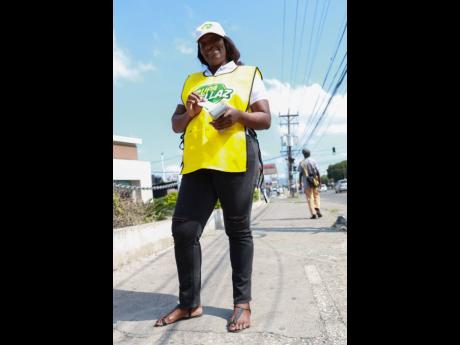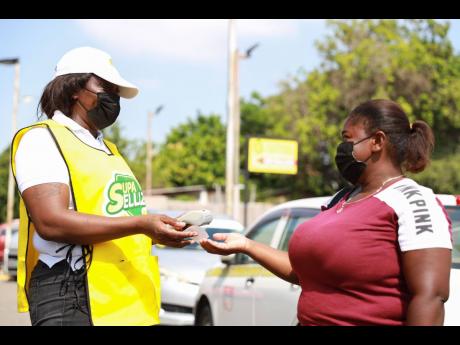SVL bringing illegal lottery game sellers into the fold
Amid the emergence of new rivals and an economy pressured by the pandemic, Supreme Ventures Limited, which trades as SVL Group, saw a decline in both net lottery sales revenue and group profit in the March quarter. But the company, whose dominance...
Amid the emergence of new rivals and an economy pressured by the pandemic, Supreme Ventures Limited, which trades as SVL Group, saw a decline in both net lottery sales revenue and group profit in the March quarter.
But the company, whose dominance is still untested, is working on strategies to gin up revenue and gain market share in the lottery space that it once monopolised but now shares with Mahoe Gaming and Goodwill Gaming.
One of its tactics involve locating and regularising the underground trade in its popular Lotto game. SVL Group executive and division CEO of Prime Sports Jamaica Limited, Xesus Johnson, is reporting that the company began the process of formalising former black-market sellers of illicit Lotto tickets in December.
Such traders, often found in low-density, rural communities, as well as the hard-to-reach sections of urban areas, are being outfitted with SVL point-of-sale machines, Johnson said.
Typically, the black-market traders would sell the fake Lotto tickets, pocket the revenue, and pay out winnings from the take, based on the game results from the publicised SVL lottery prize draws. With the deployment of SVL terminals to the reformed ‘subagents’, those earnings will now flow to the gaming company.
Alongside the reorientering of the black market, SVL is also partnering with micro-entrepreneurs to drive ticket sales – two channels that could potentially become the source of hundreds of new agents.
For the quarter ending March, the SVL Group, whose operations include sports betting, horse racing, pin codes, bookmaking and microfinance, experienced an improvement in overall revenue by nearly six per cent to $10.7 billion, net of prizes. But lottery game revenue fell by more than seven per cent, from $4.99 billion to $4.62 billion in the period, net of prize payouts.
Within the quarter, the Izzizzi game, operated by Mahoe Gaming, and Lucky Play, operated by Goodwill Gaming, both entered the market. To ring-fence its market share, SVL started paying out more prize money for certain games, the upshot of which was a 31 per cent increase in gross ticket sales to $16.9 billion within the quarter, according to the company’s earnings report, but a decline in net inflows due to the extra cost incurred in paying out prizes, Johnson added.
For instance, the payout for every $10 bet on Cash Pot – SVL’s most lucrative game – was increased from $260 to $305, according to the company.
Johnston says the effort was worth it, and necessary, because of the impact the pandemic had been having on lottery sales. With tens of thousands of jobs lost and a contracting economy, there has been less disposable income for unnecessary purchases such as lottery tickets.
The net effect of the market changes and reconfigured prizes was an 18 per cent compression of the gaming company’s bottom line in the first quarter, from profit of $737 million in the previous period to $602 million.
“The marginal decline in our net profit over the period should be expected when you’re giving higher payouts to customers and greater giveback to the market by SVL,” said Johnston.
“As with every other business, COVID and the restrictions do have an impact on us. What we’re fortunate with, is that the strategic imperatives implemented have served us well at a time like this,” he said.
The company’s ‘strategic imperatives’ include: convenient access; growing market share; and “also having the best products in the market,” said Johnston.
“When we came in to February 2021, we just accelerated some of the consumer promotions we already had,” he said of the noticeable increase in advertising, when the new rivals entered the market.
Johnston says there was a 40 per cent year-on-year increase in “givebacks”, that is, prize payouts, across the gaming segment, amid other changes to the portfolio of 11 games.
Money Time draws were moved down from every five minutes to every four minutes; mega balls were added to make the games more exciting; and each quarter the Lotto jackpot was made to grow faste,r beginning with the escalator promotion in the fourth quarter of 2020, he said.
Before SVL entered the scene as Jamaica’s first licensed lottery company in 2001, illegal games such as ‘picka peow’ and ‘drop pan’ thrived. SVL seized on their popularity to promote its lottery offerings, to the extent that Cash Pot and the Pick games actually mimic what obtained in the early illegal games.
In turn, as SVL’s games gained popularity, the one-man illegal gaming operators shifted to take advantage of the lottery company’s success.
Now, SVL is looking to stem, and corral, the revenue leak by formalising the illegal sellers of its games as legal agents, leading to what the company calls its Supa Sellaz concept.
“Yes, it is a part of the strategy to reach that last mile in the small communities, whether it be an inner-city enclave or a very rural community that would not be able to accommodate a full Supreme Ventures store,” said Johnston.
“It also allows us to reach back into the market and grab market share from the illegal market,” he said.
SVL’s game distribution network currently comprises more than 1,200 agents.
Johnston declined to identify the numbers targeted under the Supa Sellaz initiative.
“You’re actually equipping a micro-entrepreneur,” Johnson said. “It all falls into the strategic objective, which aims to provide convenient access to our customers and to take market share from illegal operators, who had been gaining traction in the market in the past.”


